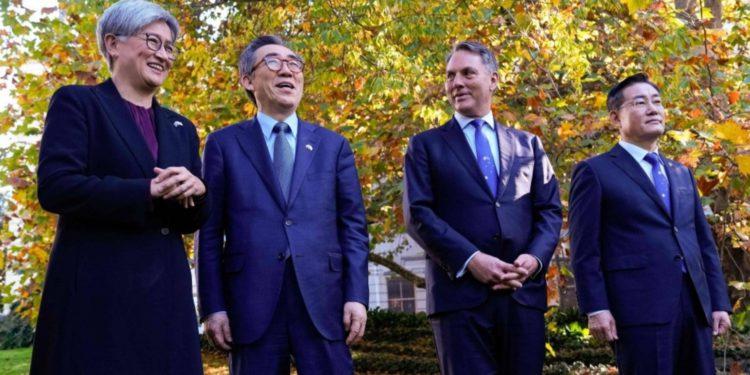South Korea is contemplating sharing advanced military technology with the United States, the United Kingdom, and Australia through the AUKUS partnership, according to South Korean Defense Minister Shin Won-sik. The potential collaboration was discussed during meetings between South Korea and Australia’s defense and foreign ministers in Melbourne.
Shin Won-sik stated that South Korea has engaged in discussions about joining a portion of the AUKUS defense agreement involving the U.S., Britain, and Australia. This revelation comes shortly after the pact indicated its willingness to consider the inclusion of Japan.
South Korean Defense Minister Shin Won-sik, speaking through an interpreter during a joint news conference in Melbourne, expressed enthusiasm about the possibility of South Korea joining AUKUS Pillar II.
The AUKUS partnership, formed in 2021 and comprising Australia, the United Kingdom, and the United States, aims to counter China’s expanding military influence in the Indo-Pacific region.
While Pillar I focuses on equipping Australia with nuclear-powered submarines, Pillar II seeks to develop and share advanced technologies, including hypersonics, anti-submarine warfare, cyberweapons, quantum computing, and artificial intelligence.
Shin emphasized that South Korea’s defense and technological capabilities could contribute to Pillar II and regional peace and stability. Australian defense chief Richard Marles echoed Shin’s sentiment, acknowledging South Korea’s impressive technology and anticipating potential collaboration opportunities as AUKUS Pillar II evolves.
As discussions progress, South Korea’s role in AUKUS Pillar I remains uncertain. However, its invitation to participate in Pillar II signals a strengthening of ties with the core AUKUS partners and potential future engagements in advanced military technology development and sharing initiatives.
Despite Seoul’s longstanding desire to acquire nuclear-powered submarine technology, the United States has consistently opposed the idea due to proliferation concerns and potential instability on the Korean Peninsula.
However, formal consultations regarding South Korea’s potential collaboration in AUKUS Pillar II, along with Japan and other countries, are anticipated to commence later this year. Japan, being the first country formally considered for Pillar II, is expected to enhance its capabilities and bolster its defense industry.
China has vehemently opposed groupings like the AUKUS pact, often denouncing it as the inception of an “Asian NATO” and warning of potential regional destabilization. Chinese Defense Ministry spokesman Wu Qian reiterated China’s opposition to exclusive military alliances targeting China, emphasizing the Asia-Pacific’s role as a platform for peace and development rather than geopolitical rivalry.
While the AUKUS partners have expressed their intention to engage like-minded partners in Pillar II projects, expanding the pact’s second pillar may encounter challenges due to stringent U.S. restrictions on technology-sharing.
The U.S. State Department recently unveiled a plan to ease these restrictions, aiming to facilitate the transfer of military equipment and sensitive technology to Britain and Australia. However, concerns persist that rapid expansion could complicate the deal, with Canberra and London wary of potential delays resulting from additional members.
Also Read:
- Naver, Intel, and KAIST Forge Alliance: Launch Collaborative AI Lab
- Samsung Boosts Chip Production Capabilities through Partnership with ZEISS Group
- Korean Air, Hyundai, KT Lead Successful UAM Operations in Test
- Hyundai Unveils ST1: Electric Work Vans with Futuristic Design
- KT Launches Responsible AI Center: Safeguarding the Future of Artificial Intelligence







